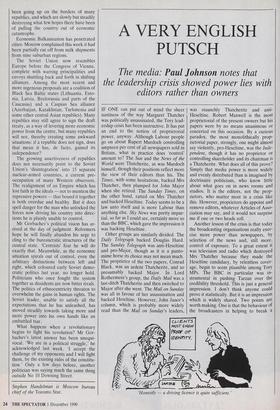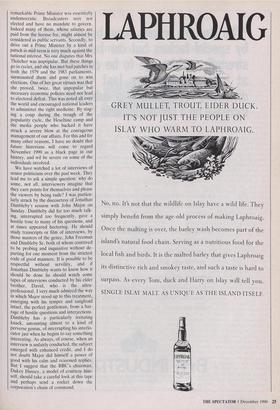A VERY ENGLISH PUTSCH
the leadership crisis showed power lies with editors rather than owners
IF ONE can put out of mind the sheer nastiness of the way Margaret Thatcher was politically assassinated, the Tory lead- ership crisis has been instructive. It has put an end to the notion of proprietorial power, anyway. Although Labour people go on about Rupert Murdoch controlling umpteen per cent of all newspapers sold in Britain, what in practice does 'control' amount to? The Sun and the News of the World were Thatcherite, as was Murdoch himself, though their positions reflect more the view of their editors than his. The Times, with some hesitations, backed Mrs Thatcher, then plumped for John Major when she retired. The Sunday Times, on the other hand, ratted on Mrs Thatcher and backed Heseltine. Today seems to be a law unto itself and is more Labour than anything else. Sky News was pretty impar- tial, so far as I could see, certainly more so than the BBC, which gave the impression it was backing Heseltine.
Other groups are similarly divided. The Daily Telegraph backed Douglas Hurd. The Sunday Telegraph was anti-Heseltine and pro-Major, though as it is a panto- mime horse its choice may not mean much. The proprietor of the two papers, Conrad Black, was an ardent Thatcherite, and so presumably backed Major. In Lord Rothermere's group, the Daily Mail was a last-ditch Thatcherite and then switched to Major after she went. The Mail on Sunday was all in favour of her assassination and backed Heseltine. However, John Junor's column, which is probably more widely read than the Mail on Sunday's leaders,
was staunchly Thatcherite and anti- Heseltine. Robert Maxwell is the most proprietorial of the present owners but his papers were by no means unanimous or concerted on this occasion. By a curious paradox, the most monolithically prop- rietorial paper, strongly, one might almost say violently, pro-Heseltine, was the Inde- pendent, though it has no proprietor or controlling shareholder and its chairman is a Thatcherite. What does all of this prove? Simply that media power is more widely and evenly distributed than is imagined by doctrinaire politicians, who know little about what goes on in news rooms and studios. It is the editors, not the prop- rietors, who matter most in a crisis like this. However, proprietors do appoint and remove editors, whatever Articles of Asso- ciation may say, and it would not surprise me if one or two heads roll.
Another lesson of the crisis is that today the broadcasting organisations really exer- cise more power than newspapers, by selection of the news and, still more, control of exposure. To a great extent it was television and radio which destroyed Mrs Thatcher because they made the Heseltine candidacy, by relentless cover- age, begin to seem plausible among Tory MPs. The BBC in particular was in- strumental in pushing Tarzan over the credibility threshold. This is just a general impression. I don't think anyone could prove it statistically. But it is an impression which is widely shared. Two points are worth making. One is that the behaviour of the broadcasters in helping to break a `Honestly — a driving licence is quite sufficient.' remarkable Prime Minister was essentially undemocratic. Broadcasters ares not elected and have no mandate to govern. Indeed many of them, whose salaries are paid from the license fee, might almost be considered as public servants. Secondly, to drive out a Prime Minister by a kind of putsch in mid-term is very much against the national interest. No one disputes that Mrs Thatcher was unpopular. But these things go in cycles, and she has met bad patches in both the 1979 and the 1983 parliaments, surmounted them and gone on to win elections. One of her great virtues was that she proved, twice, that unpopular but necessary economic policies need not lead to electoral defeat. This was noted all over the world and encouraged national leaders to administer the right medicine. By stag- ing a coup during the trough of the popularity cycle, the Heseltine camp and the media people who backed it have struck a severe blow at the courageous management of our affairs. For this and for many other reasons, I have no doubt that future historians will come to regard November 1990 as a black page in our history, and wil be severe on some of the individuals involved.
We have watched a lot of interviews of senior politicians over the past week. They lead me to ask a simple question: why do some, not all, interviewers imagine that they earn points for themselves and please the viewers by being rude? I was particu- larly struck by the discourtesy of Jonathan Dimbleby's session with John Major on Sunday. Dimbleby did far too much talk- ing, interrupted too frequently, gave a hostile tone to many of his questions, and at times appeared hectoring. He should study transcripts or film of interviews, by those masters of the genre, John Freeman and Dimbleby Sr, both of whom contrived to be probing and inquisitive without de- parting for one moment from the strictest code of good manners. It is possible to be respectful without servility, and if Jonathan Dimbleby wants to know how it should be done he should watch some tapes of interviews conducted by his elder brother, David, who is the ultra- professional. I very much admired the way in which Major stood up to this treatment, emerging with his temper and sangfroid intact, the perfect gentleman, from a bar- rage of hostile questions and interjections. Dimbleby has a particularly irritating knack, amounting almost to a kind of perverse genius, of interrupting his interlo- cutor just when he begins to say something interesting. As always, of course, when an interview is unfairly conducted, the subject emerged with enhanced credit, and I do not doubt Major did himself a power of good with his calm and reasoned replies. But I suggest that the BBC's chairman, Dukey Hussey, a model of courtesy him- self, should take a careful look at this tape and perhaps send a rocket down the corporation's chain of command.











































































 Previous page
Previous page